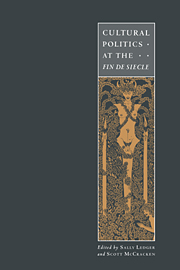Book contents
- Frontmatter
- Contents
- List of illustrations
- Notes on contributors
- Acknowledgements
- Introduction
- 1 The flight to the real
- 2 The New Woman and the crisis of Victorianism
- 3 Empire, ‘race’ and feminism at the fin de siècle: the work of George Egerton and Olive Schreiner
- 4 W. B. Yeats and Irish cultural politics in the 1890s
- 5 The double lives of man: narration and identification in late nineteenth-century representations of ec-centric masculinities
- 6 Henry James and the spectacle of loss: psychoanalytic metaphysics
- 7 ‘A very curious construction’: masculinity and the poetry of A. E. Housman and Oscar Wilde
- 8 The Pilgrims of Hope: William Morris and the dialectic of romanticism
- 9 Urban utopias: socialism, religion and the city, 1880 to 1900
- 10 Vampires and the empire: fears and fictions of the 1890s
- 11 Utopia, Limited: nationalism, empire and parody in the comic operas of Gilbert and Sullivan
- 12 Technologies of monstrosity: Bram Stoker's Dracula
- 13 Postmodernism, a Chance to reread?
- 14 Is market society the fin of history?
- Select bibliography
- Index
8 - The Pilgrims of Hope: William Morris and the dialectic of romanticism
Published online by Cambridge University Press: 29 September 2009
- Frontmatter
- Contents
- List of illustrations
- Notes on contributors
- Acknowledgements
- Introduction
- 1 The flight to the real
- 2 The New Woman and the crisis of Victorianism
- 3 Empire, ‘race’ and feminism at the fin de siècle: the work of George Egerton and Olive Schreiner
- 4 W. B. Yeats and Irish cultural politics in the 1890s
- 5 The double lives of man: narration and identification in late nineteenth-century representations of ec-centric masculinities
- 6 Henry James and the spectacle of loss: psychoanalytic metaphysics
- 7 ‘A very curious construction’: masculinity and the poetry of A. E. Housman and Oscar Wilde
- 8 The Pilgrims of Hope: William Morris and the dialectic of romanticism
- 9 Urban utopias: socialism, religion and the city, 1880 to 1900
- 10 Vampires and the empire: fears and fictions of the 1890s
- 11 Utopia, Limited: nationalism, empire and parody in the comic operas of Gilbert and Sullivan
- 12 Technologies of monstrosity: Bram Stoker's Dracula
- 13 Postmodernism, a Chance to reread?
- 14 Is market society the fin of history?
- Select bibliography
- Index
Summary
This chapter makes a place for William Morris's striking verse narrative sequence, The Pilgrims of Hope, at the latter end of the nineteenth-century dialectic of romanticism. The thirteen poems which make up The Pilgrims of Hope trace out the complex emotional designs discernible within political, sexual, and comradely entanglements in the setting of the British socialist and labour movement and the Paris Commune of 1871, setting against one another the individualist claims of feeling and the collective ones of social change. By commemorating a recent historical event and invoking it as an aspiration as well as a memory, Morris's poem (serialized between 1885 and 1886 in the Socialist League journal, Commonweal), offers a ‘glimpse of the coming day’ made visible through the power of ‘hope’ – a category of practical value for Morris and one capable of redeeming the past in a revolutionary future. In this way, Morris appropriates the romance genre for contemporary use: ‘I have heard people mis-called for being a romantic’ he wrote, ‘but what romance means is the capacity for a true conception of history, a power of making the past part of the present.’
The Pilgrims of Hope interweaves a personal dialectic of identity and a public one of history. The hero and heroine, Richard and his wife, move from the agricultural plebeian culture of the countryside to an artisanal life in London, where they become socialists.
- Type
- Chapter
- Information
- Cultural Politics at the Fin de Siècle , pp. 160 - 183Publisher: Cambridge University PressPrint publication year: 1995



